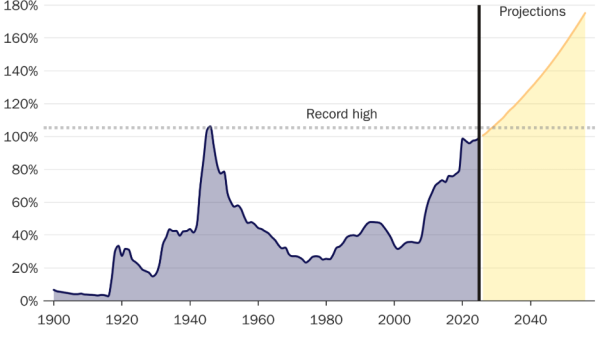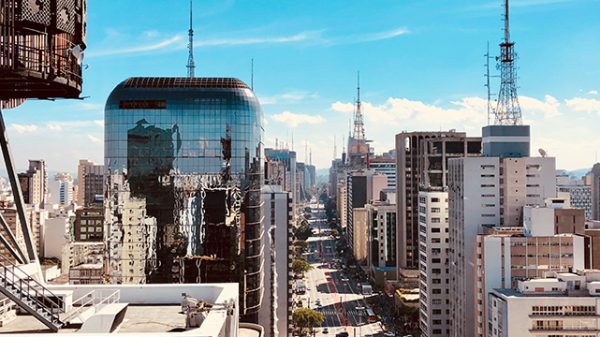During his first year as president, Javier Milei has been waging a bitter but largely successful campaign against inflation.
Now, Argentines received more welcome news: their economy is growing again.
“Economic activity rose 1.3 percent from April, above the 0.1 percent median estimate from analysts in a Bloomberg survey and the first month of growth since Milei’s term began in December,” Bloomberg reported on July 18. “From a year ago, the proxy for gross domestic product grew 2.3 percent.”
The positive economic report, based on data from the Argentine government, is a surprise to many.
The 2.3 percent year-over-year increase defied expectations of a decline of similar magnitude, Bloomberg reported. As Semafor notes, the Argentine economy was projected to have the least economic growth of any country in the world in 2024, according to the International Monetary Fund.
A ‘Wrecking Ball’?
Argentine economists I spoke to said that the numbers are encouraging, but the country’s economy is far from being out of the woods.
As most people know, Milei inherited an economic mess decades in the making. When the self-described anarcho-capitalist assumed office in December, Argentina was suffering from the third highest inflation rate in the world—211 percent year over year. The poverty rate was north of 40 percent, and Argentina’s economy was declining.
With his country’s economy in a full tailspin from decades of Peronism, Milei proposed a series of economic reforms dubbed “shock therapy” that consisted primarily of three components: slashing government spending, cutting bureaucracy, and devaluing the peso.
Critics warned that these measures would be disastrous, and many took it for granted that the remedies would deepen Argentina’s recession.
The former head of the International Monetary Fund’s Western Hemisphere Department, Alejandro Werner, said Milei’s strategy could tame inflation, but at great cost.
“A deep recession will also take place,” Werner wrote, “as the fiscal consolidation kicks in and as the decline in household income depresses consumption and uncertainty weighs on investment.”
Felix Salmon, the chief financial correspondent at Axios, concurred, comparing Milei’s policies to “a wrecking ball.”
“Milei’s budget cuts will cause a plunge in household income, as well as a deep recession,” wrote Salmon.
Despite these warnings, Milei delivered his “shock therapy” plan in the first few months of his presidency. Tens of thousands of state workers were cut as were more than half of government ministries, including the Ministry of Culture, as well as the Ministries of Labor, Social Development, Health, and Education (which Milei dubbed “the Ministry of Indoctrination”). Numerous government subsidies were eliminated, and the value of the peso was cut in half.
Even before Milei’s policies were given a chance to succeed, many continued to attack them.
“Shock therapy is pushing more people into poverty,” journalist Lautaro Grinspan wrote in Foreign Policy in early March. “Food prices have risen by roughly 50 percent, according to official government data.”
Yet the official government data Grinspan cited was a report from December 2023, before Milei had even assumed the presidency.
Contrary to the dire predictions, the results of Milei’s policies have been better than even many of his supporters had dared hope.
During the first half of 2024, inflation cooled for five straight months in Argentina, the Associated Press reported in July. Though consumer prices were up 4.6 percent in June from the previous month, that’s down from a 25 percent month-over-month increase in December, when monthly inflation peaked in Argentina. Meanwhile, in February the government saw its first budget surplus in more than a decade. And just days ago, an economic report was published showing a massive decline in poverty in Argentina.
Many doubted that these successes were possible, and the conventional wisdom said that wringing inflation out of the economy and slashing government spending could only be achieved at great cost: a deepening recession.
Escaping Recession?
The data suggest that, contrary to what so many people predicted, Argentina may not be slipping deeper into recession following Milei’s shock therapy. Instead, its economy is healing.
“Argentina is officially out of recession after 7 months of Javier Milei’s economic reforms,” Daniel Di Martino, a University of Columbia student pursuing his PhD, tweeted. “Remember, the economy was in recession since mid-2023, half a year before he got into office.”
Others, however, warn that it’s premature to say that Argentina is out of its recession.
“I will be careful of claiming ‘out of the recession,’” Nicolás Cachanosky, a native of Argentina and Associate Professor of Economics at the University of Texas at El Paso, told me. “Maybe the Argentine economy is getting out of a recession. Maybe not. All I’m saying is that it is too early to confirm, given these numbers.”
Cachanosky notes that interannual figures can be misleading, and that the data in question are relative values and not technically growth rates. While it’s still unclear where Argentina’s economy will go from here, it bears exploring why so many people, including many economists, doubted that its economy could be growing again already. There are two primary reasons, one of which is legitimate.
The first reason is a legitimate concern that sharp reductions in government spending will likely result in short term pain, even though it’s a necessary step toward economic healing.
“The government spends a bunch of money and keeps people employed,” one economist I spoke with told me. “When that slows down, you’re going to be able to measure the impact of that.”
This is why some free market economists I spoke with expressed doubts that Argentina had already escaped recession. Cutting tens of thousands of jobs, even unproductive ones, and slashing hundreds of millions in subsidies is bound to have an impact on economic activity. Long term that impact will be positive because it will result in a more efficient allocation of resources, but it’s not unreasonable to assume it will first result in economic pain.
A second reason is a poor understanding of economics.
In the Keynesian school of economics, it’s taken as gospel that government spending fuels economic growth. This is why you’ll find so many Keynesians who argue that even destructive phenomena like war and hurricanes are actually good for the economy, because they stimulate government spending.
This was the argument economist Paul Krugman made several years ago when he said that an alien invasion, real or fake, would be good for the economy, since it would mobilize a massive amount of military spending, similar to World War II.
The idea is simple: government spending is good even if it’s producing goods that are unnecessary, such as weapons created for an alien invasion that is not even real.
The idea that Argentina would be slashing government spending during a recession runs counter to Keynesian orthodoxy, which teaches that recessions are precisely when “fiscal stimulus” is needed the most, since negative economic conditions often result in a predictable market failure: a decline in spending.
Broken Windows and Economic Growth
In other words, Argentina is flipping the macroeconomic script. In a world in which government spending hikes are deemed “a perfect solution in battling recessions,” Milei is providing the opposite: he’s slashing government outlays.
Yet a Mercatus Center study conducted by Tony Caporale and Marc Poitras, titled “The Trouble with Keynesian Stimulus Spending,” points out the obvious problem with such stimulus schemes:
[The Keynesian] approach fails to account for several significant sources of cost. Besides the cost of waste inherent in government spending, financing the spending requires taxation, which entails an excess burden, the reduction in output resulting from workers’ reduced incentive to work. Furthermore, the employment of even previously idle resources involves lost opportunities to invest in alternative uses of these resources.
Caporale and Poitras are talking about an elementary economic concept: opportunity costs. These costs refer to what one foregoes or gives up to purchase a good or service, an idea the economist Frédéric Bastiat explored in his famous “broken window” parable. Economist Jonathan Newman offers a tidy summary of the story, which appeared in Bastiat’s 1850 essay That Which Is Seen, and That Which Is Not Seen.
It goes like this: a boy throws a brick at a baker’s window and a crowd gathers to discuss the economic consequences. They console the baker by pointing out that glass-repair companies need business, too, so it isn’t all bad news. After further reflection, they conclude that total employment and spending in the community has increased because of the broken window, and that this little spark of spending by the baker to repair the window sets off a chain reaction of spending. Now the glazier has extra cash to spend on various items, and the people who sold him those things now have extra income, and so on.
The crowd draws the conclusion that destruction is beneficial for the economy because it stimulates spending and employment.
Does this sound absurd and too good to be true? Well, it is. Bastiat’s parable revealed the absurdity of Keynesian economics before Keynesian economics existed.
Bastiat was challenging readers to see the unseen. Economists shouldn’t focus solely on the glazier’s profits that resulted from the rock thrown at the baker’s window, any more than they should focus solely on the jobs created by military spending. They must also focus on the costs of these actions, too.
This is the flaw that has long plagued Keynesians, and it helps explain why so many took it as gospel that slashing government spending in Argentina would deepen its recession.
When it came to Milei’s reforms, critics and prognosticators were focusing on the seen: tens of thousands of lost jobs, and billions in reduced spending. On one hand, this is perfectly rational. These cuts will come with easily measurable costs, and are likely to reduce economic activity in the short term. On the other hand, whether they are seen immediately or not, there are countless opportunities created by Milei’s reforms, which are dismantling the least productive parts of Argentina’s economy: its bureaucracy.
Whether Argentina’s burst in economic activity in May was a blip or the beginning of a long-term trend of economic recovery is something only time will tell. (Data indicate there was a sharp increase in agricultural production, which could be explained by favorable seasonal conditions or some other factor.)
It’s certainly possible that, after decades of economic pain from Peronism and mass money-printing, Argentina has more work to do before its economic recovery arrives. Yet Adam Smith once noted that the formula for prosperity is surprisingly simple, and it doesn’t contain government “stimulus”: just “peace, easy taxes, and a tolerable administration of justice.”
Milei knows this, fortunately. And he is showing no signs of relenting in his campaign to crush inflation and government spending to return Argentina to prosperity.
“What [is] the alternative?” he told the BBC. “To continue to print money like the previous administration that generates inflation and ends up affecting the most vulnerable?”


























